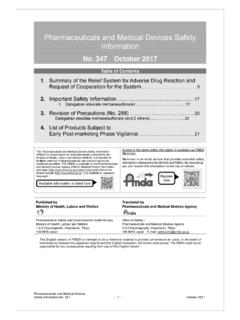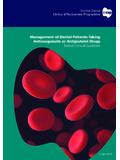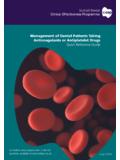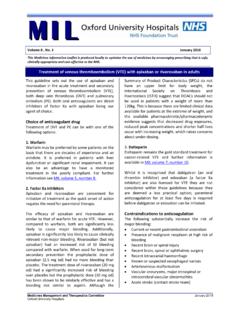Transcription of What is a Colonoscopy? - gaes.co.nz
1 what is a colonoscopy ? colonoscopy is a procedure that enables your doctor to carefully examine the lining of the colon. It is used for diagnosing and treating a variety of problems encountered in the colon (also called the large bowel or large intestine). It is performed using an instrument called a colonoscope which is a flexible tube that is about the thickness of a finger. It is inserted via the rectum into the colon and advanced slowly round the whole colon. Usually it is possible to enter the end of the small bowel (terminal ileum). The colonoscope has a wide angled camera in the tip and it captures all the images of the inner lining of your bowel. This image is transmitted to a TV monitor which your specialist looks at during the examination.
2 what preparation is required? For a successful colonoscopy , it is essential that the bowel is completely clean. You will be informed beforehand what dietary Oesophagus restrictions to follow and instructions on the appropriate bowel cleansing routine. In general, however, it is recommended that you go on a low fibre/low residue diet for 3 days prior to the colonoscopy test. The day before the test you will be asked to drink a special bowel prep consisting of a large volume of a special cleansing solution in association with special oral laxatives. It is very important that the colon is completely clean so that the procedure is safe, accurate, and complete. The exact details of when and what bowel prep or medications to take will be sent to you with an appointment letter.
3 Occasionally one or more enemas may also be required when you attend for your appointment. what about my usual medications? Most medication can be continued as usual but some medications may interfere with the examination or bowel prep. Please inform your doctor or the staff at Gastroenterology and Endoscopy Specialists as soon as possible prior to the examination if you are taking insulin, aspirin or blood thinners'. such as warfarin, clopidogrel or dabigatran. If you are on iron tablets please stop one week prior to colonoscopy . Please ensure you inform your specialist and admitting nurse or back. Your specialist will perform a digital examination of of any allergies. your rectum (back passage) and then will slowly advance the colonoscope along the length of the colon.
4 The entire lining of what can I expect during a colonoscopy ? your colon is visualised during the procedure, often including When you arrive for the colonoscopy a nurse will take history the end of the small bowel (terminal ileum) depending upon of your current health and past medical problems. Please also the indication of the procedure. The lining of the bowel once bring in a list of all the medications you are taking. You will then again is carefully examined on withdrawal of the colonoscope. be asked to change clothes and may be given a small enema to The colonoscopy procedure itself usually takes approximately ensure your bowel is clear. 30 minutes, although it may take longer if polyps are to be removed.
5 You should plan on a total of 2 hours for the whole A colonoscopy is performed in a fully equipped theatre. procedure and recovery. colonoscopy generally is well tolerated and rarely causes much discomfort. Your doctor will give you intravenous sedative to In some cases (<5%) it is not possible to pass the help you relax and better tolerate any discomfort. You will be colonoscope through the entire colon. In this case a special given additional oxygen into throughout the procedure and X-ray (CT Colon) test may be arranged. a probe will be placed on your finger to monitor your blood oxygen levels and your heart rate. You will lie on your side what is a colonoscopy ? what if the colonoscopy shows something accreditation.
6 We are also all members of Quality Endoscopy New Zealand, your guarantee of the highest quality endoscopy. abnormal? If your doctor thinks that an area needs further evaluation, he Significant complications can occur in up to 1 in 1,000 patients. or she will pass a instrument through the colonoscope to obtain The two most serious are: perforation' / a hole in the bowel a biopsy (a sample of the colon lining) This is painless. The wall (the risk is increased if there is a need to remove large specimens are sent to the Pathology Laboratory for analysis. polyps) and bleeding. These complications are rare but if they Your doctor may also find polyps during as colonoscopy and he occur the perforation can be fixed by surgery and occasionally or she will remove them during the examination.
7 Biopsies are even by sealing the perforation with clips at the time of the used to identify many conditions including inflammatory bowel colonoscopy . Any bleeding usually is minor and, even if serious, disease amongst others. can be treated via colonoscopy and rarely requires surgery. Some patients might have a reaction to the sedatives or what are polyps and why are they removed? complications from underlying heart or lung disease. Polyps are abnormal growths in the colon lining that are usually Although complications after colonoscopy are uncommon, it is benign though, if left, may become cancerous over time. They important to recognise early signs of possible complications. vary in size from a few millimetres to several centimetres.
8 Contact your specialist if you notice severe abdominal pain, Because cancer begins in polyps, removing them is a very fever and chills, or rectal bleeding of more than half a cup. Note important means of preventing bowel cancer. that bleeding can occur several days after the procedure. How are polyps removed? Any other questions? Your doctor will usually remove polyps using a wire loop passed If you still have any questions about the procedure, the reasons through the colonoscope and an electrical current called snare for doing it, any alternative tests, the costs, or insurance coverage polypectomy'. For smaller polyps, the polyps may be removed do not hesitate to speak to the staff at Gastroenterology and with biopsy instruments.
9 You should feel no pain during a Endoscopy Specialists (03 378 6236). polypectomy. The polyps are then sent to the Pathology Laboratory for analysis. Our endoscopists are highly trained specialists and welcome your questions regarding the procedure. Our endoscopists are all members of Quality Endoscopy New Zealand, your guarantee what happens after the colonoscopy ? of the highest quality endoscopy. You will be taken on your bed to the recovery room where you will be monitored until the effects of the medication have worn off. Your doctor will then explain the results of the examination to you, although you will have to wait up to 5. days for the results of any biopsies. Even if you feel alert after the procedure, if you have had a sedative your judgement and reflexes may be impaired for the rest of the day.
10 It is therefore important that someone drives you home and remains with you for the remainder of the day. It is also unsafe for you to drive or operate any machinery, make any important decisions or drink any alcohol for 24 hours. You may have some cramping or bloating because of the air introduced into the colon during the examination. This should Dr Catherine Dr Bruce A/Prof Richard Dr Teresa disappear quickly with the passage of gas. You should be able Stedman Chapman Gearry Chalmers-Watson to eat normally after the procedure, except in rare cases. MBChB, FRACP, PhD MB ChB, FRACP MB ChB, FRACP, PhD BMedSc, BMBS, MRCP, MD. what are possible complications of colonoscopy ? colonoscopy and polypectomy are generally safe procedures when performed by physicians or surgeons specially trained and experienced in endocsopy.





